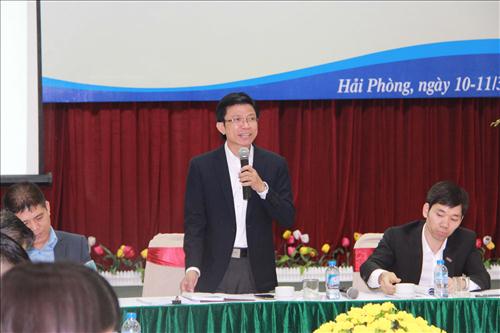
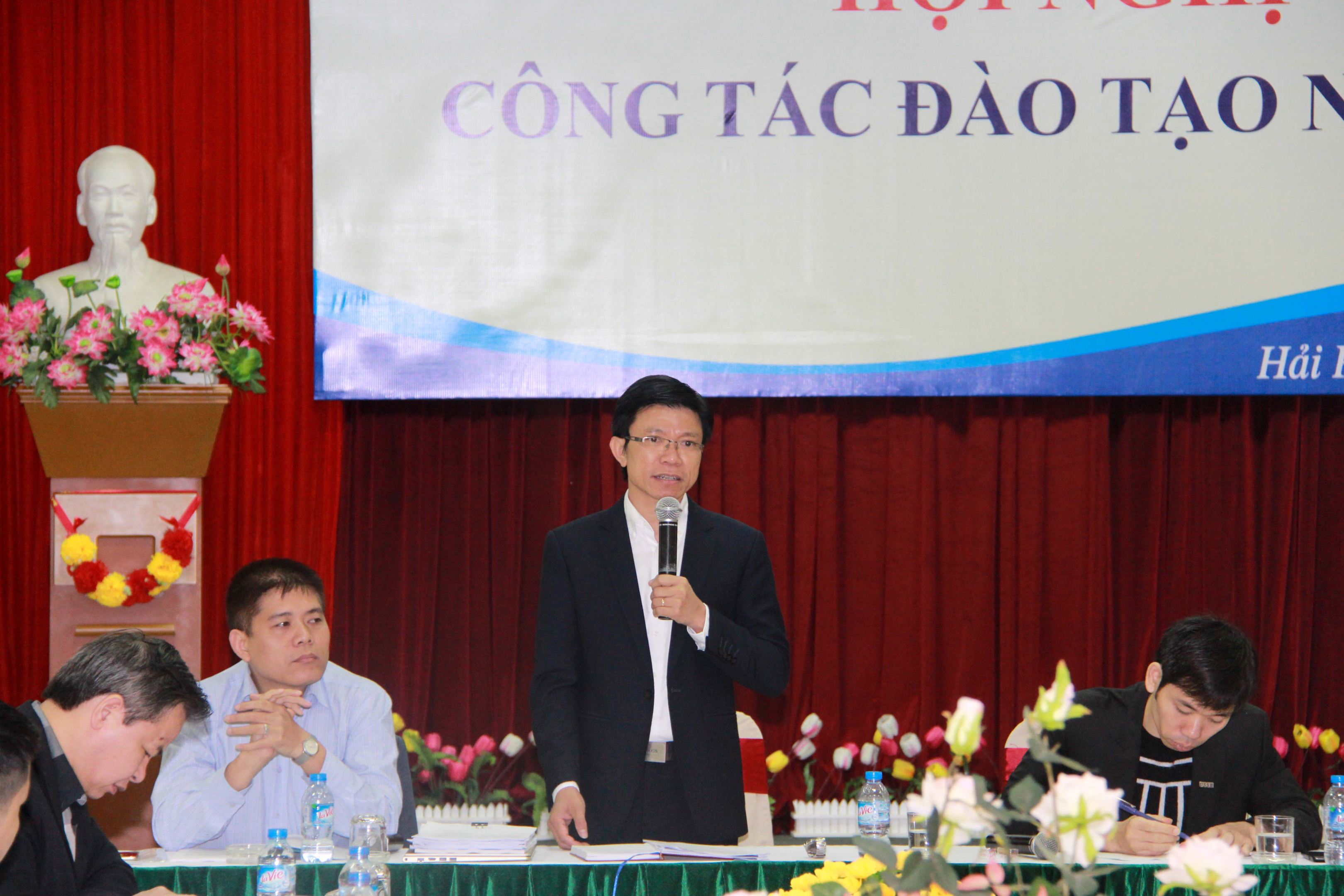
Associate Professor Dr. Hoang Anh Tuan, Vice Principal of the School is chairing the conference.
Chairing the meeting, Associate Professor Dr. Hoang Anh Tuan, Vice Principal of the School, presented arguments demonstrating the need to increase connectivity between the school's training majors: "From the perspective of learners, many students have complained about the isolation of the school's training majors. This reduces their understanding as well as their job opportunities after graduation."
"Research data shows that nearly 70% of students' jobs after graduation are not in the field of academic scientific research, which is the strength of the school. And the fact that international students repeatedly refuse to choose to study because of the lack of connection between training programs has posed challenges for the school in needing solutions to enhance this connection," Associate Professor Dr. Hoang Anh Tuan shared.
In the world and in Vietnam, this trend of interconnection is clearly present. As in the case of the University of Technology, VNU, they have organized an interconnection of 4 to 5 majors for students to choose from in addition to the required basic subjects. Or in the case of the University of Economics, VNU, they have designed a very large joint program, helping students majoring in accounting and business administration only need to study 26 more credits to be able to get two regular degrees upon graduation...
At the University of Social Sciences and Humanities, the Faculty of Journalism and Communication is one of the few units that has pioneered adjustments to maximize the interconnectivity between majors. Accordingly, students majoring in Journalism can choose from 1 to 3 options for their major, which are print-electronic newspapers, radio-television, and public relations. However, this implementation is only limited to one faculty and has not been widely implemented across the entire school.
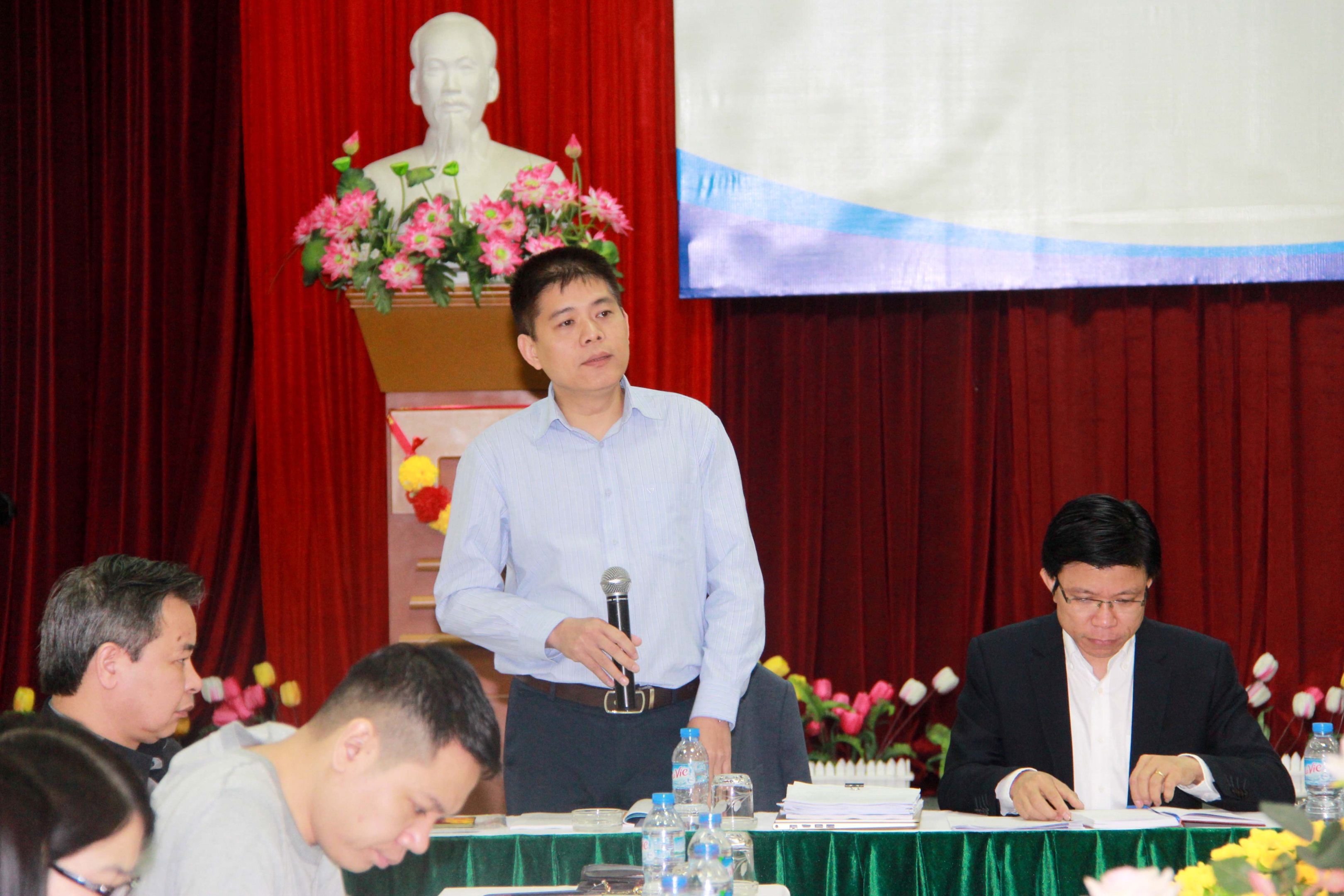
Associate Professor, Dr. Bui Thanh Nam, Head of the School's Training Department, is presenting at the conference.
To be more specific about this issue, Associate Professor Dr. Bui Thanh Nam, Head of the School's Training Department, presented a report on the current status of training programs at the University of Social Sciences and Humanities and directions for adjustment.
Accordingly, the connection between the school's training units is still limited. The number of non-field knowledge subjects with two or more majors is too small (only about 6%); there are many subjects with the same name but different durations when used in different majors; some subjects have different names but the same content; the training programs are almost isolated from each other, the level of supplementation or interaction is very low; many elective knowledge subjects have not been included in teaching. This has caused difficulties in building training programs in the direction of connection and linkage. While the school's resources are still difficult, not including many subjects in teaching causes waste.
Knowledge modules are still divided quite small and isolated between majors, affecting training quality, requiring one lecturer to take on many courses or invite more part-time lecturers.
The opportunity for students to choose courses between majors is limited, leading to the policy of putting learners at the center of the form. This situation has caused many difficulties in continuing to complete the school's credit-based training roadmap.
From the above reality, the School will adjust and perfect training programs to improve quality, ensure connectivity and connection between majors in the School and schools in VNU.
The adjustment principles are based on the bases and regulations of the Ministry of Education and Training, and the Training Regulations at VNU. Accordingly, adjusting and perfecting the programs must be based on determining output standards in accordance with the strategy, mission, goals and core values of the School and training units. The adjustment work will both ensure inheritance and demonstrate new factors in the content of knowledge blocks, modules as well as the structure of the training program. The training program after completion will be integrated, interconnected, and linked between fields, blocks, and groups of fields in a school as well as schools in VNU and integrated with the region.
At the conference, Associate Professor Dr. Bui Thanh Nam, Head of the School's Training Department, also presented a draft of the adjusted content, divided by industry and industry group with two options; divided by industry group - 2 options; Interconnection between industries within the industry group; decentralization of responsibility for developing modules for each knowledge framework and a plan to adjust the training program.
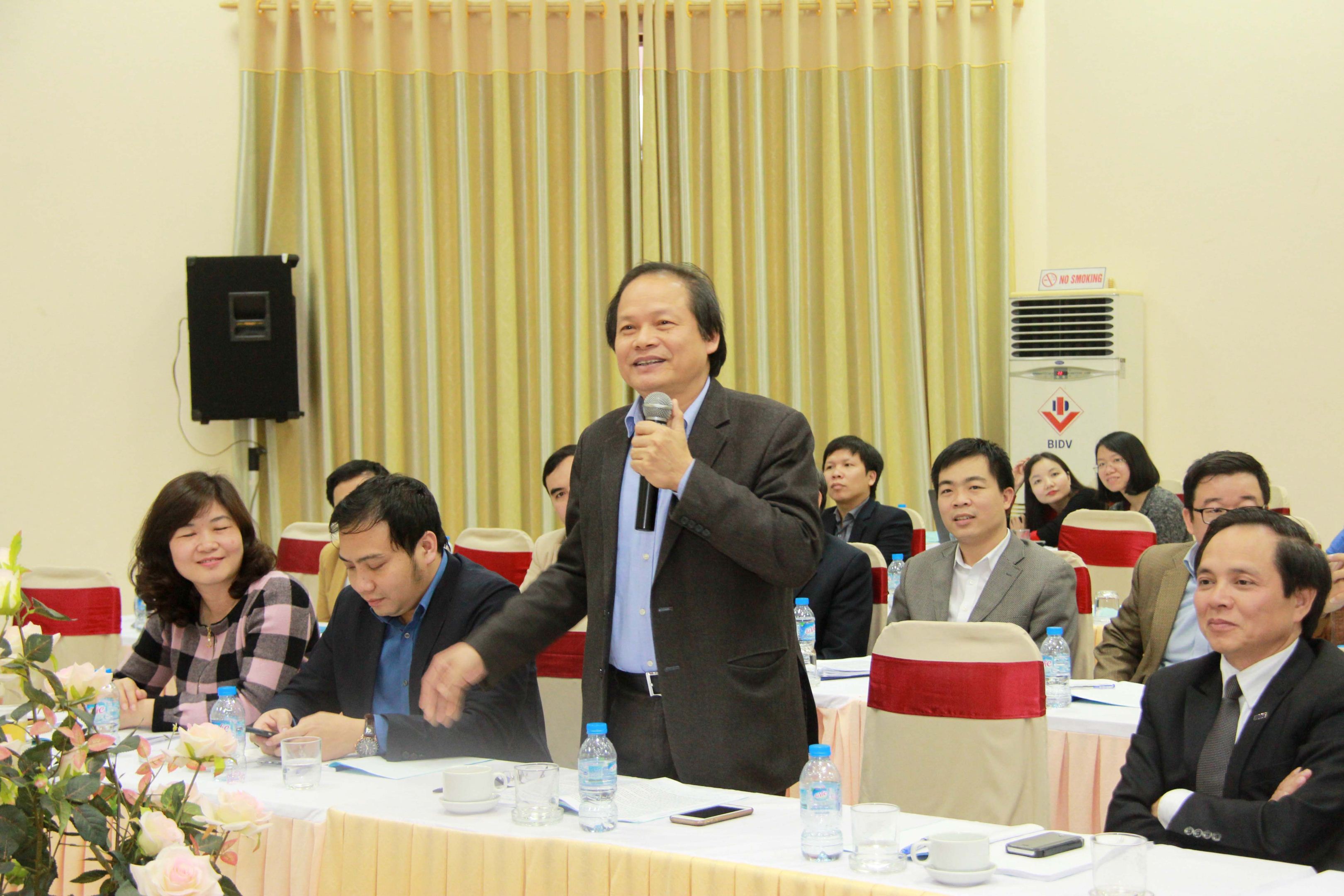
Prof. Dr. Nguyen Van Khanh, Chairman of the School's Science and Training Council, is giving his opinion at the conference.
Giving his opinion on this issue, Prof. Dr. Nguyen Van Khanh, Chairman of the School's Training Science Council, fully supports it. The professor said, "Adjusting the training program is a desire, an urgent and inherent need of each program and each university. When making changes, the School should revolve around three factors: basic - updated - flexible."
Roadmap for implementation, the Board of Directors and the Training Department need to determine which major belongs to which group? Then assign a team of staff to take charge of organizing the adjusted knowledge blocks? Review all elective subjects in the direction of which subjects should be replaced if there are no students for 3 years? Encouraged subjects in the direction of 3 credits.
Prof. Dr. Nguyen Van Khanh also reminded the Board of Directors and the training department about the time and progress of implementation, the estimated budget and legal documents related to this activity.
Expressing his support for the above policy, Prof. Dr. Nguyen Van Kim, Party Secretary and Vice Principal of the School, added: The School needs to specifically calculate which transfer target we will choose from the current transfer directions (between training majors in the School; between training levels and training methods; between units in VNU, outside units training in the same field and with the regional and international training environment). From there, focus on finding solutions to implement, remove the most basic bottlenecks and create a transparent mechanism in the organization and implementation to improve the training quality of the School.
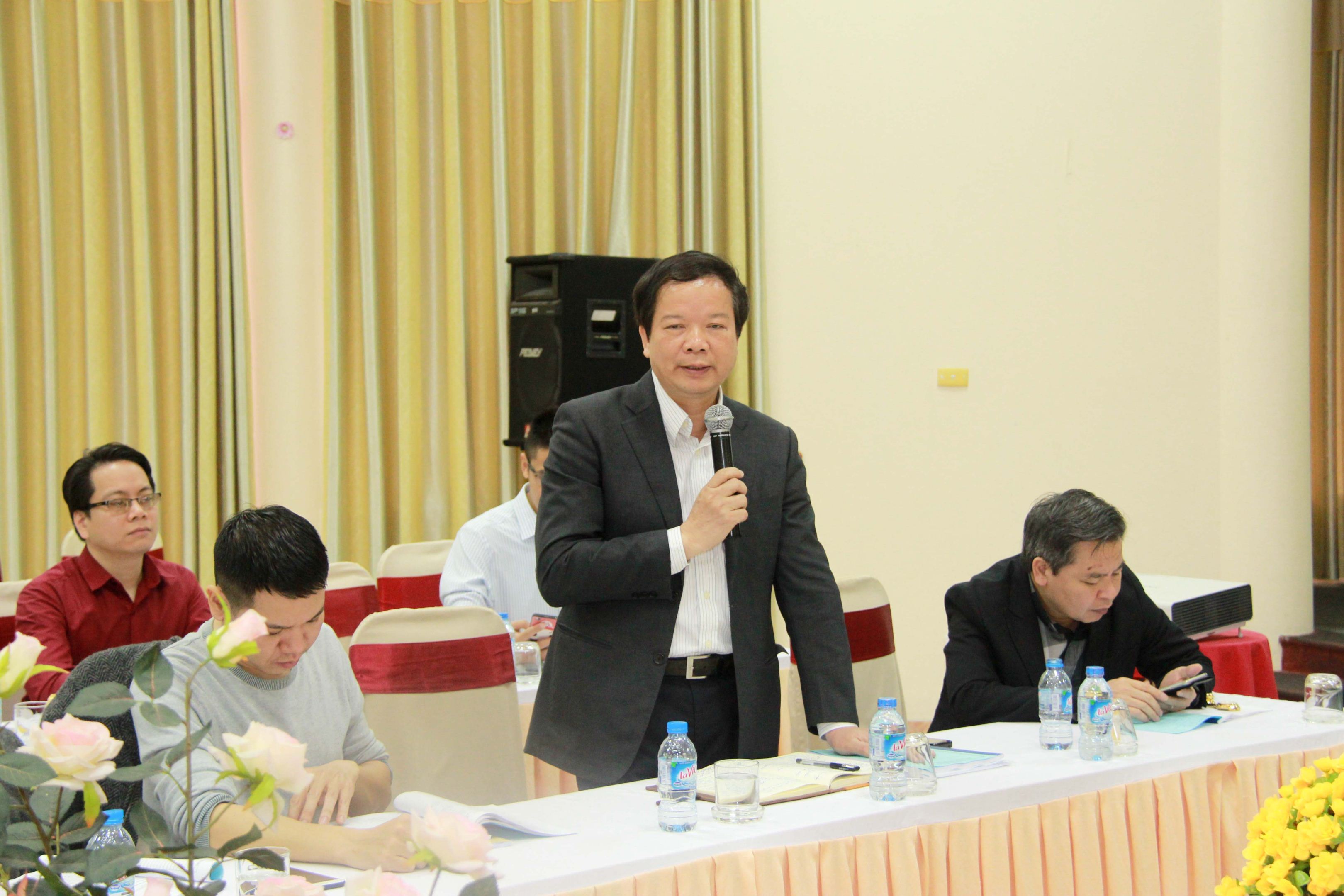
Prof. Dr. Nguyen Van Kim, Party Secretary, Vice Principal of the School contributed opinions at the conference
Agreeing with the supporting view, Associate Professor Dr. Dang Thi Thu Huong, Head of the Faculty of Journalism and Communication, suggested that the department should carefully consider the division. The division should be in clusters, so that students can choose comprehensively and systematically.
Regarding the organization of subjects, Associate Professor Dr. Truong Thi Khanh Ha said that in order to increase the connection without losing the identity value of each major, the School can adjust in such a way that the compulsory subjects of one major will be the elective subjects of another major. At the same time, the School also has policies to recognize graduates when choosing those alternative subjects.
Speaking in his role as both the School's Principal and a lecturer, Professor Pham Quang Minh said, "Change is necessary. Change is for the overall development of the School and for the students."
Prof. Dr. Pham Quang Minh shared the spirit of the Director of VNU to bring the entire team of lecturers and students to enjoy the benefits of the national university education environment. Students entering VNU will be able to study all the majors and knowledge they like. Therefore, it is necessary to remove barriers in accessing knowledge, follow an interdisciplinary direction, and create for learners a diverse and rich knowledge base.
Author:Hoai An
Newer news
Older news